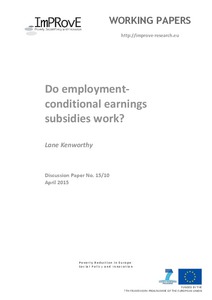Do employment-conditional earnings subsidies work?

ImPRovE, Antwerp ; Kenworthy, Lane
ImPRovE - Antwerp
2015
29 p.
collective bargaining ; employment ; low wages ; employment subsidy
Germany ; Sweden ; United Kingdom ; USA
Working papers
15/10
Employment
English
Bibliogr.
"Cash transfers and tax credits to people in paid work but with low earnings are increasingly prominent in affluent countries. How effective are these programs at reducing poverty and increasing employment? The US and UK experience suggests that, in an economy with weak unions and limited labor market regulations, an employment-conditional earnings subsidy increases employment among persons at the low end of the labor market but reduces low-end wage levels somewhat. Overall, it appears to boost the absolute incomes of low-end households. Even so, cross-country comparison offers little support for a conclusion that the institutional configuration in these countries, including the employment-conditional earnings subsidy, is especially effective at generating high and rising employment, high and rising incomes among low-end households, or low and decreasing relative poverty rates. Quite a few other affluent nations have done as well as or better than the UK and the US in recent decades. In rich countries with stronger collective bargaining, employment-conditional earnings subsidies tend to be small, sector-specific, or temporary and so are unlikely to have sizeable effects on aggregate employment or incomes. Germany and Sweden have implemented larger versions. Germany's appears to have increased employment but reduced wage levels and low-end households incomes. Sweden's is too new to permit assessment of its impact."
Digital
The ETUI is co-funded by the European Union. Views and opinions expressed are however those of the author(s) only and do not necessarily reflect those of the European Union or the ETUI.